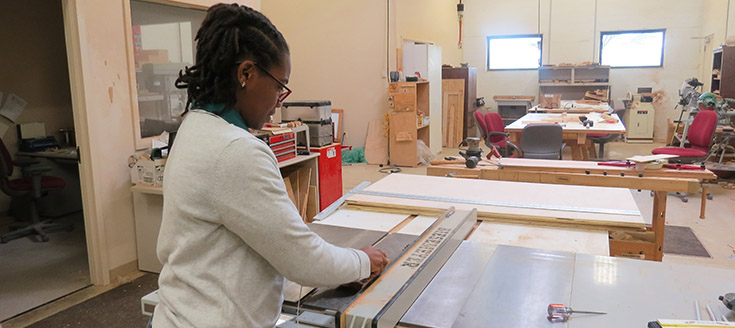
FEBRUARY 2014 - DORS consumer Elizabeth (Liz) Moyer is now a woodshop instructor at
Blind Industries and Services of Maryland (BISM). Liz used to work as an emergency medical technician and a fire fighter in Baltimore City, but lost her vision due to complications from diabetes, so she came to DORS to figure out how to start a new career.
Liz was referred to DORS by her eye surgeon. She worked with DORS counselor Muttasim Fadl and he encouraged her to meet with a nurse to manage her diabetes and to join a support group to help with her adjustment to blindness. She also had an assistive technology assessment and an academic assessment. Muttasim connected her with BISM, which turned out to be the most helpful. “Because everything I needed to be successful was here. I couldn’t read print, so they helped me learn Braille. I didn’t know how to travel, so they taught me how to get safely to work. Also, here you learn that there are others going through the same thing as you.”
While at BISM Liz learned to work in their woodshop and that eventually led to her job as the instructor. “I’m a product of the program and the opportunity came along and they said ‘Do you want the job?’” She now works at BISM full-time, teaching thirty hours per week and filling in as needed in other areas for a total of forty hours. In the woodshop, she teaches the students how to use a drill press, a radial arm saw, a band saw, and eventually, they move on to hand tools. When Liz is asked how people who are blind can use potentially dangerous power tools, she demonstrates how to use a click ruler. “It’s the only thing that’s different, all the techniques and equipment are the same as for sighted people; safety first.”
Muttasim thinks Liz's spirit and previous professional training helped her find new successes. "What struck me about Liz, she didn't have the anger of 'Why me?’ she was just eager to learn...I think her training as a firefighter helped her. It's like you see a fire and you just go in and fight it...you fight the unknown."
Liz says DORS gave her the support she needed to move forward: “I would tell people [who have lost their vision] to contact DORS because they have the services you need. Your life is not over...it’s just a different start. You can do everything you want to do, just differently.”
